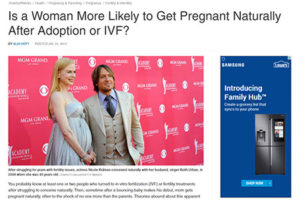Is a Woman More Likely to Get Pregnant Naturally After Adoption or IVF?
By Alia Hoyt
 You probably know at least one or two people who turned to in vitro fertilization (IVF) or fertility treatments after struggling to conceive naturally. Then, sometime after a bouncing baby makes his debut, mom gets pregnant naturally, often to the shock of no one more than the parents. Theories abound about this apparent phenomenon, with everything from old wives’ tales to legit medical evidence attempting to explain it away.
You probably know at least one or two people who turned to in vitro fertilization (IVF) or fertility treatments after struggling to conceive naturally. Then, sometime after a bouncing baby makes his debut, mom gets pregnant naturally, often to the shock of no one more than the parents. Theories abound about this apparent phenomenon, with everything from old wives’ tales to legit medical evidence attempting to explain it away.
More and more people who have trouble getting pregnant are turning to fertility treatments. This shift is due in significant part to the fact that many women are waiting longer to conceive. Women age 35 or older are considered “geriatric” in pregnancy age (a term that most women despise with a passion — smart doctors use the phrase “advanced maternal age” instead).
Possible infertility is flagged if a couple is not able to get pregnant after having unprotected sex for one year, although many fertility experts evaluate couples after six months if they are age 35 or older. Fertility is believed to decline somewhere around our mid-30s, although it is hardly one-size-fits-all. Many younger women experience fertility issues, and still others older than 35 get pregnant quickly without medical intervention.



